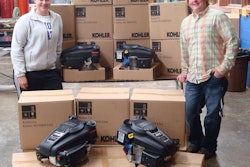
As a distributor, I have learned a lot from the dealers I interact with on a daily basis. They have taught me a lot about what it takes to beat out the big box competition and excel in the industry. Doing both requires selling your worth as a dealer not just with words, but also your actions.
Our company motto is "Facta Non Verba", which is Latin for "Deeds Not Words". We have always believed it is best to show and not tell. We all need to lead first by example.
It’s important for dealers to work to provide excellent service, so they don’t have to spend much time telling potential customers about the value of their services. Too often, when we tell someone what we offer, it creates a possibility for us not to meet their expectations. Demonstrating your abilities should be done in a way that targets your market audience and clearly shows your strengths.
Selling to the commercial user
Dealers who deal primarily with commercial users consider other dealers their primary competition. For these dealers, it's all about service. The end users who have been in business a while know that service after the sale is the key to their own profitability. Their crews become a cost center rather than a team of revenue producers if their tools aren’t working.
Dealers should demonstrate to these commercial customers the extensiveness of their parts inventory and the quality of their service department. Show them how you will be able to keep their business running and profitable.
The best way to do so is to take the time to show the customer your inventory. I know dealers who actually march customers through their parts inventory and explain everything to them. They tell customers how they order, what they stock, and how quickly they can get parts from their suppliers. You can also share which brands have the best parts service.
When you are done in the parts department, walk them through the service department and highlight the technology and capabilities of your service department. Tell them about training schools attended by technicians and how it calculates into quicker diagnostics and shorter down time.
Selling to the homeowner
Dealers dealing with consumers generally consider mass merchants their primary competition and frequently deal with new customers. It’s crucial that your floor people know the product and have the skill to identify the shopper’s wants and needs, as the two may differ.
The floor person must be able to confidently take the customer to the display and put the right product into their hands. This is the kind of treatment that the customer won’t get at the mass merchant. Employees need to be trained to qualify new customers for the right products. It’s important to play the role of an educator without making customers feel as though they are unknowledgeable.
There are countless books on how to sell, yet the biggest mistake new salespeople make is depending on their natural sales ability. That won’t work well. Just like someone who is naturally athletic doesn’t automatically make a good football player; they must train.
Probably the first and easiest step is to answer open-ended questions, questions for which the answer isn’t a simple yes or no. For example, ask what the customer will be using the product for. Don’t ask the customer about the specific product they are eying up to purchase, ask them about what they intend to do with the product.
There are many opportunities for dealers to attract customers that don’t involve price cutting. This is great news since the big box prices are impossible to match. Simply stating the unit price is a start. Too often consumers assume the small dealer has high prices because of lack of buying power. Get a website and promote your vast line of products at entry level prices. People go to mass merchants for selection as often as they do for price. Every dealer should have a website and a facebook, taking steps to get their company name and offering in the eyes of consumers.
Bring customers back with services
A true metric for knowing how you stack up to the competition is difficult, but a good technique is to ask your customers what they think. The question will harvest good information while forcing the customer to think about the comparison. During the conversation, ask the customer which services are most important to them and tell them how you provide those services.
It seems that the most common need is easy access to the dealership while pulling a landscape equipment trailer. So, the dealer needs a place for the customer to pull in and be able to maneuver a trailer.
Tailoring your business to their needs shows them that their business is appreciated. When they know their business is appreciated, they will be more likely to return. Price doesn’t seem to be the primary factor once the business is earned.
Offer the customer a chance to provide feedback and give them a reason to return. The only way to ensure customers will come back is to assure them that you will continue to meet their needs again and again in the future.

![Doosan Bobcat Wacker Neuson Stack 2ec Js Pb V6e[1]](https://img.greenindustrypros.com/mindful/acbm/workspaces/default/uploads/2025/12/doosan-bobcat-wacker-neuson-stack2ecjspbv6e1.CPyyz8ubHn.png?auto=format%2Ccompress&bg=fff&fill-color=fff&fit=fill&h=100&q=70&w=100)








![Doosan Bobcat Wacker Neuson Stack 2ec Js Pb V6e[1]](https://img.greenindustrypros.com/mindful/acbm/workspaces/default/uploads/2025/12/doosan-bobcat-wacker-neuson-stack2ecjspbv6e1.CPyyz8ubHn.png?ar=16%3A9&auto=format%2Ccompress&bg=fff&fill-color=fff&fit=fill&h=135&q=70&w=240)








